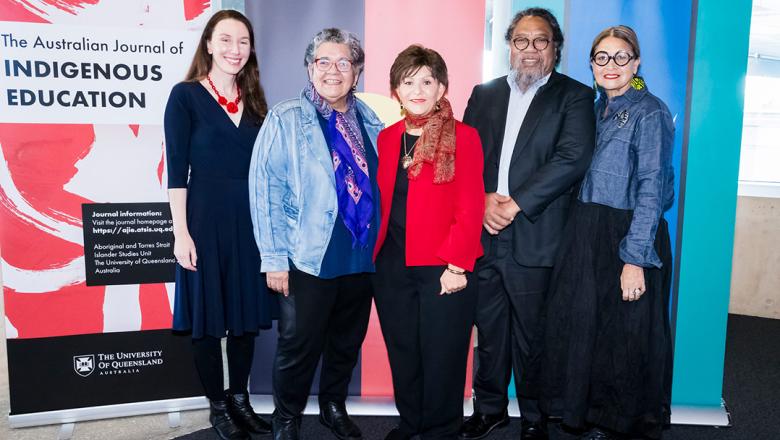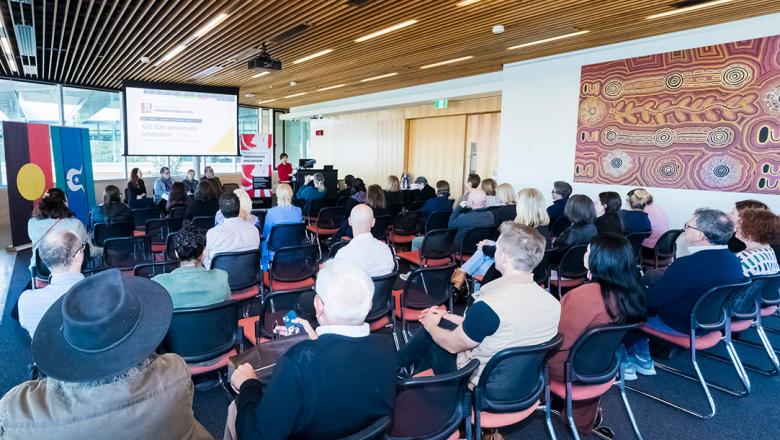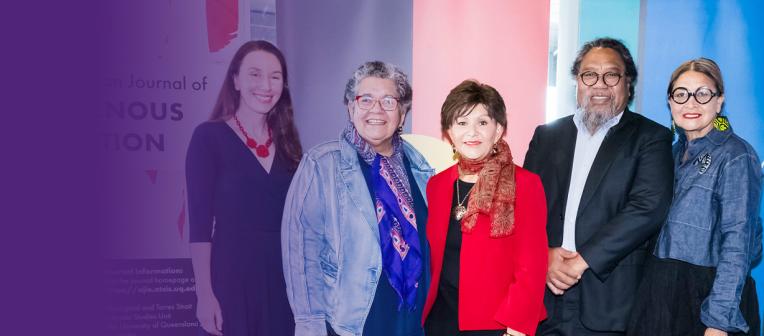Around 70 supporters (with 20 on-line) attended The Australian Journal of Indigenous Education (AJIE) 50th Anniversary Celebration at The University of Queensland St Lucia Campus on 26 July 2023.

The celebration was emceed by UQ Deputy Vice-Chancellor Professor Bronwyn Fredericks.
Special guests included UQ Professor of Indigenous Education Tracey Bunda, James Cook University Deputy Vice-Chancellor (Indigenous Engagement and Strategy) Professor Martin Nakata, University of the Sunshine Coast Director, Indigenous and Transcultural Research Centre, Professor Maria Raciti, and UQ School of Education Honorary Research Senior Fellow Aunty Denise Proud.
Other attendees included Elders and community members, Journal Editorial Board members, and UQ staff and students.
Professor Fredericks has been the Journal co-editor since 2019 and works closely with co-editor Professor Martin Nakata and Dr Katelyn Barney as Managing Editor.
She explained that the Journal started in 1973 as the Aboriginal Child at School, aiming to provide a medium whereby teachers in the field of Aboriginal and Torres Strait Islander education could share their thinking and their strategies for successful teaching.

The Journal was originally funded by the Department of Aboriginal Affairs in Canberra and hosted by the Department of Education, before moving to the Aboriginal and Torres Strait Islander Studies Unit at UQ.
The first editor was Dr Betty Watts (1973-1982), with David Carline as Managing Editor, when it was Aboriginal Child at School.
Since then, the journal has had a number of highly-esteemed Editors including Dawn Muir, Penny Tripcony, Michael Williams, Jackie Huggins, Christine Stratigos, Jo Lampert, John Budby, Polly Walker, Elizabeth Mackinlay, and Sean Ulm (Managing Editor).
In 1996, The Aboriginal Child at School was transformed into The Australian Journal of Indigenous Education and reduced to two issues per year.
In 2003, coinciding with the 30th anniversary of the Journal, the decision was taken to relaunch AJIE as a peer-reviewed research journal to reflect changes in readership and demand for quality work.
“AJIE has played and continues to play a vital role in raising awareness of educational issues for Aboriginal and Torres Strait Islander peoples, fostering debate amongst researchers, government representatives and community groups, and sharing stories of success between both Indigenous and non-Indigenous practitioners positioned in the broad area of Aboriginal and Torres Strait Islander education,” Professor Fredericks said.
“The dialogue which has taken place in AJIE over the past 50 years maps out the social, political and cultural history of Indigenous education in Australia, and draws attention to the shifting paradigms and practical outcomes.”
Last year, in 2022, AJIE began an exciting new future as an open access scholarly publication.
Aunty Denise Proud described how she published her first ever article (in 1981) in The Aboriginal Child at School which became AJIE.
Professor Nakata noted that the AJIE is now a Quartile 1 ranking journal in anthropology and Quartile 2 in education.
“We now have contributions from many countries including New Zealand, Canada, Africa, Tanzania, Taiwan, PNG and the Solomon Islands,” he said.
“AJIE has been viewed by researchers from over 100 different countries.
In the last 12 months since launching the journal as an open access publication, there have been over 99,000 views of article abstracts and over 88,000 views of full article PDFs!
“Our total archive is 145 issues, comprising 1740 articles. We aim to have complete archive back to 1973 available by early next year.
“Looking to the future – for the next decade we want to set an agenda that is bold, future-focused, focused on solutions and advance scholarship about Indigenous education that is centered on self-determination.”
Professor Bunda stressed that, over its 50-year history, the Journal has been an important outlet for disseminating research findings on Indigenous education research.
“Now the journal is open access (free to access, free to publish in) - this ensures a wide audience,” Professor Bunda said.
“It is a significant journal which fosters debate between researchers, government, and communities and shares good practice.”
The latest volume of the AJIE - 52 no. 1 – has recently been launched.

